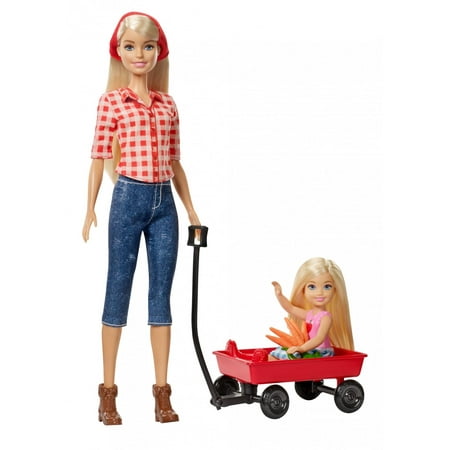Barbie Gymnastics Playset With Doll, Balance Beam, 15+ Accessories
Explore a world of competitive fun with the Barbie Gymnast Playset! When a girl plays with Barbie, she imagines everything she can become, and if you love to tumble, you can be a gymnast! This playset includes a gymnastic training environment featuring the Barbie Gymnast doll in a colorful metallic leotard. She also comes with an extra leotard, a warmup suit, extra shoes, towel, snacks and a gym bag. To get things rolling, the Barbie Gymnast doll has a balance beam, 2 rings, spinning clip and 2 batons to compete and perform. Attach Barbie Gymnast doll to the spinning clip and watch her flip across the beam! Once the competition is finished, Barbie Gymnast doll is ready to receive her trophy and medal with ribbon. What a performance! Kids will love the endless possibilities for creative expression and storytelling fun! The Barbie Gymnast Playset includes Barbie Gymnast doll and 15+ play pieces and accessories. Doll cannot stand alone. Colors and decorations may vary. For ages 3 and up.
-
$8.88
$10.88






Barbie Gymnastics Playset With Doll, Balance Beam, 15+ Accessories:Age Range: 3 Years and UpYou can be a gymnast with the Barbie Gymnast playset!Includes gymnastic training environment with Barbie Gymnast doll in a metallic leotard and these additional accessories: extra leotard, a warmup suit, extra shoes, towel, snacks and a gym bagPlayset also includes a balance beam, 2 rings, spinning clip and 2 batons that Barbie Gymnast doll can use to compete and performAttach spinning clip to Barbie Gymnast doll and watch her flip across the beam and perform other fun gymnastic moves!Barbie Gymnast doll’s hard work, strength and determination lead her to a well-earned trophy and a medal with a ribbon. What a competition!Explore a world of creative play and storytelling fun with the Barbie Gymnast Playset!Makes a great gift for kids 3 years old and up, especially those interested in sports and fitness!Doll cannot stand alone





Reviews
There are no reviews yet.